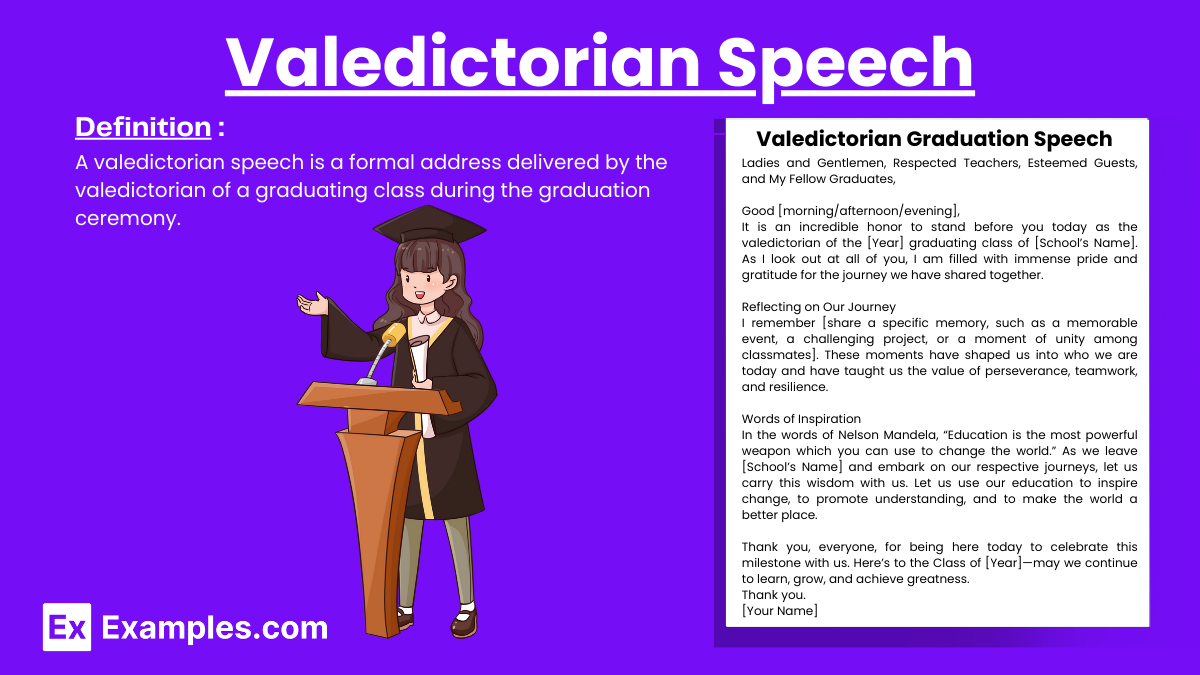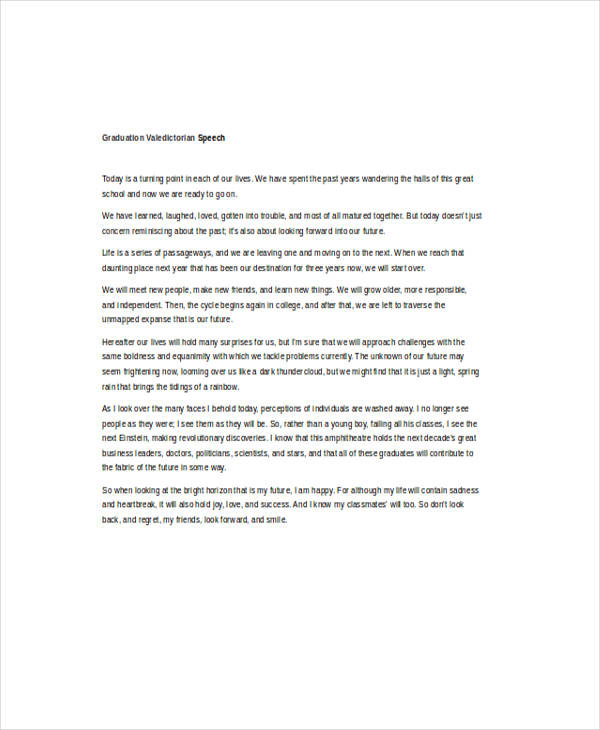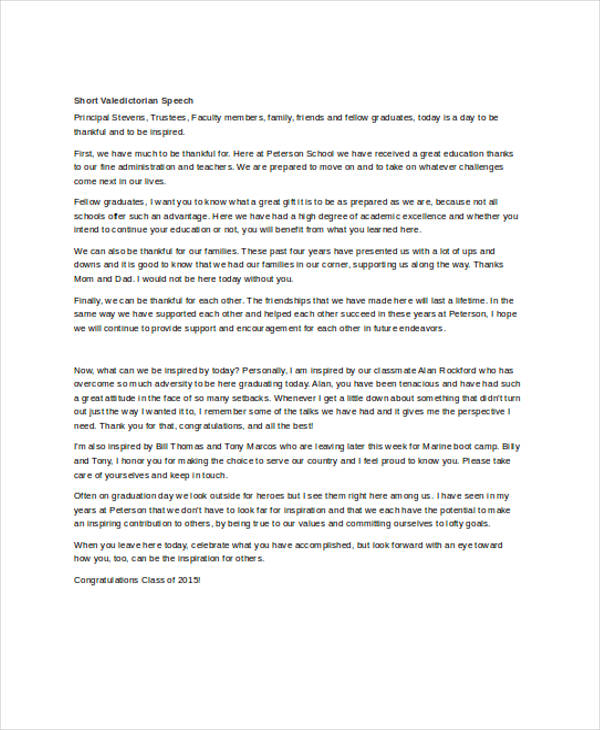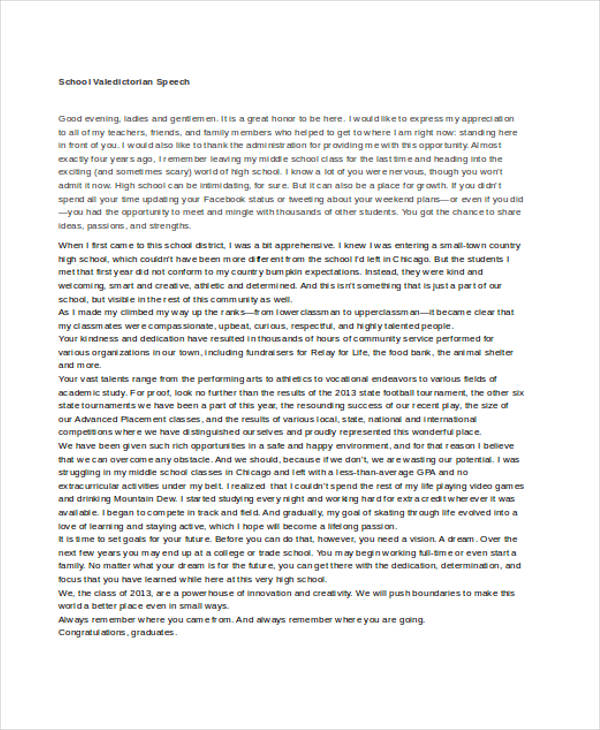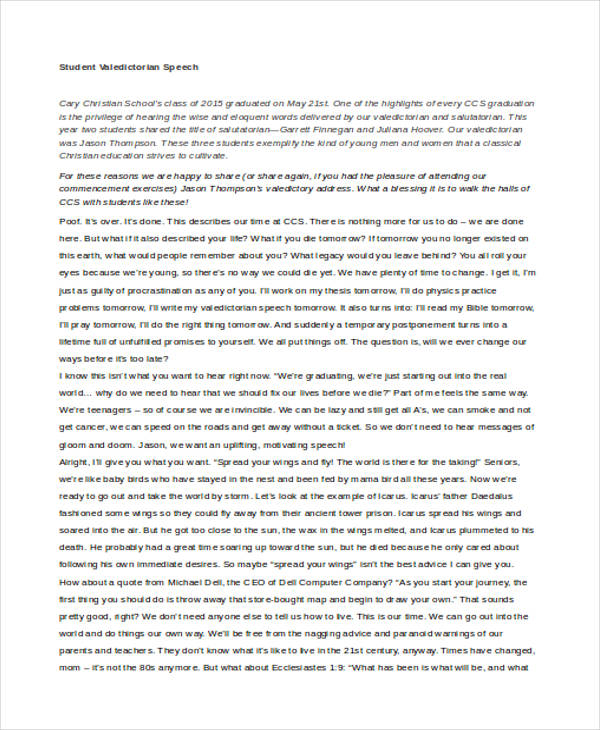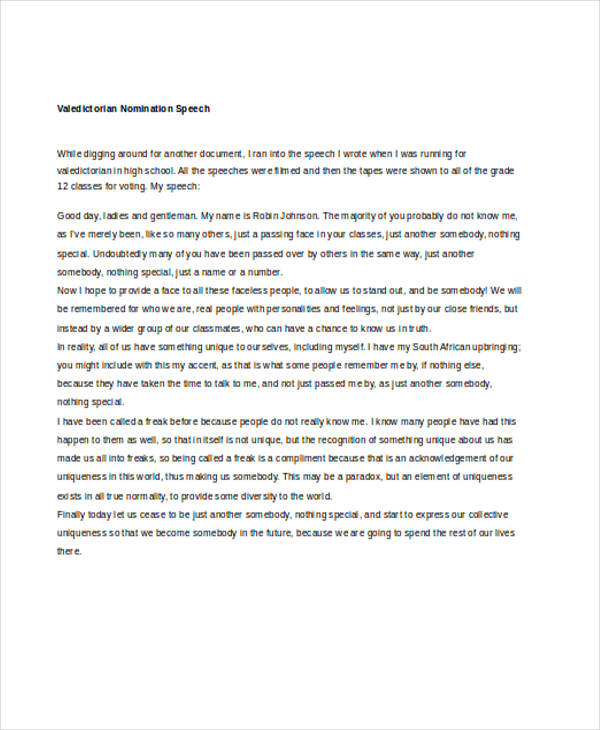7+ Valedictorian Speech Examples to Download
You have been named valedictorian, congratulations! In writing your valedictorian speech, a speech outline is necessary. A speech outline will help you compose a well-organized valedictory speech. Speech outlines will help you identify the important details of your speech and put them in order. Simply put, speech outlines will be your guide from the beginning to the end of your speech composition.
What Is a Valedictorian Speech?
Valedictorian Speech Bundle
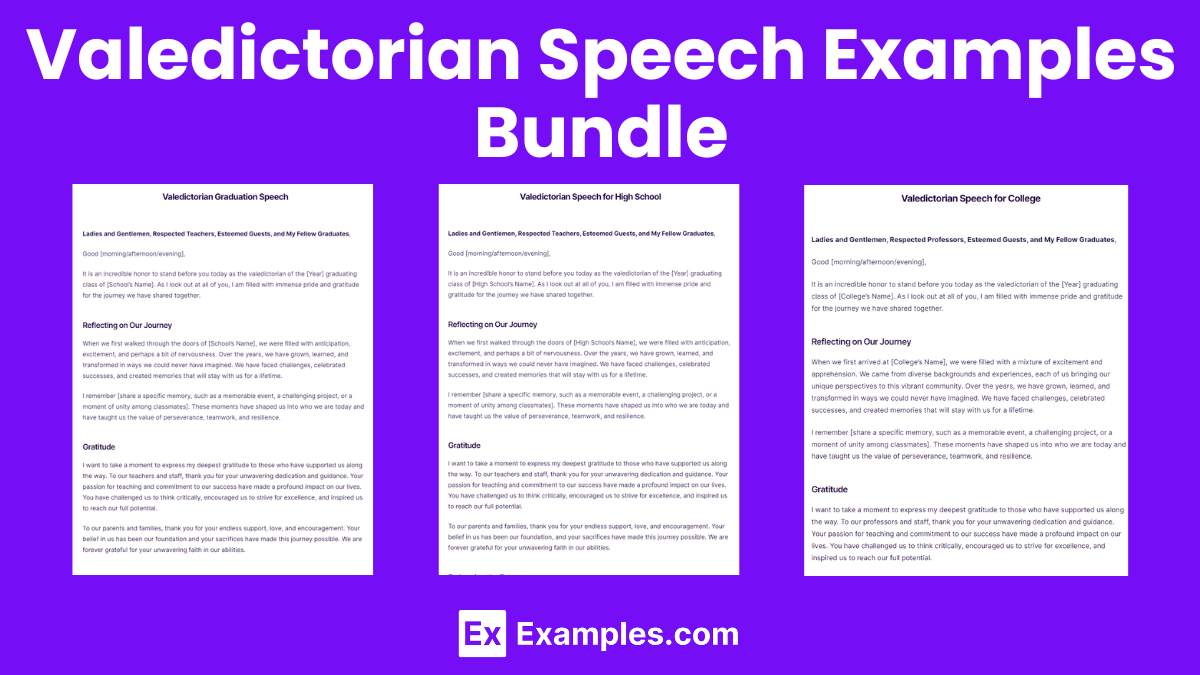
Valedictorian Speech Bundle Download
Valedictorian Speech Format
1. Opening:
Greeting:
- Start with a warm greeting to acknowledge the audience.
- Example: “Good [morning/afternoon/evening], everyone.”
Introduction:
- Introduce yourself briefly and your role as valedictorian.
- Example: “For those who don’t know me, I’m [Your Name], and I am honored to stand before you today as your valedictorian.”
Attention-Grabbing Opening:
- Use a quote, anecdote, or question to grab attention.
- Example: “As we stand on the threshold of a new chapter, I am reminded of a quote by Nelson Mandela: ‘It always seems impossible until it’s done.'”
2. Acknowledgments
Thanking the Audience:
- Express gratitude to key individuals and groups.
- Example: “I want to start by thanking our incredible teachers for their dedication, our parents for their unwavering support, and my fellow students for making this journey unforgettable.”
3. Reflection on School Experience:
Shared Memories:
- Mention significant moments or experiences that the class shared.
- Example: “We’ve come a long way since our first day here, from navigating the hallways to conquering challenging exams and celebrating our victories together.”
Lessons Learned:
- Share personal anecdotes and lessons learned.
- Example: “One lesson I’ve learned is the importance of perseverance. There were times when I felt overwhelmed, but pushing through those moments taught me resilience.”
4. Inspirational Message
Encouragement:
- Offer words of encouragement and hope for the future.
- Example: “As we move forward, let’s embrace our dreams with confidence and determination. The future is ours to shape.”
Motivational Story or Quote:
- Include a story or quote to inspire the audience.
- Example: “Remember, in the words of Steve Jobs, ‘The only way to do great work is to love what you do.'”
5. Looking Ahead
Future Aspirations:
- Talk about the bright future and the opportunities ahead.
- Example: “Today is not just an end, but a beginning. Let’s carry the spirit of optimism and hard work into our next adventures.”
Call to Action:
- Encourage your peers to take action and make a positive impact.
- Example: “Class of [Year], let’s go out and make the world a better place. Congratulations to us all!”
6. Conclusion
Final Thank You:
- Express one last round of gratitude.
- Example: “Thank you to everyone who has supported us along the way.”
Closing Statement:
- End with a powerful closing statement or a wish for the future.
- Example: “Congratulations, Class of [Year]! Here’s to our bright future!”
Valedictorian Speech Example
Opening:
“Good evening, everyone. For those who don’t know me, I’m [Your Name], and I am honored to stand before you today as your valedictorian. As we stand on the threshold of a new chapter, I am reminded of a quote by Nelson Mandela: ‘It always seems impossible until it’s done.'”
Acknowledgments:
“I want to start by thanking our incredible teachers for their dedication, our parents for their unwavering support, and my fellow students for making this journey unforgettable. Without your encouragement and guidance, we wouldn’t be here today.”
Reflection on School Experience:
“We’ve come a long way since our first day here, from navigating the hallways to conquering challenging exams and celebrating our victories together. One of my favorite memories is [insert a meaningful or humorous anecdote, e.g., ‘the time our class pulled together to organize the best school carnival ever. The teamwork and spirit we showed made it an event to remember.’]”
“Through these years, we’ve learned so much more than what’s written in textbooks. We’ve learned the importance of perseverance, the power of friendship, and the value of hard work. There were times when we felt overwhelmed, but pushing through those moments taught us resilience.”
Inspirational Message:
“As we move forward, let’s embrace our dreams with confidence and determination. The future is ours to shape. Remember, in the words of Steve Jobs, ‘The only way to do great work is to love what you do.’ Find your passion and pursue it relentlessly.”
“We are stepping into a world full of opportunities and challenges. Let’s use the knowledge and skills we’ve gained here to make a positive impact. Whether it’s in science, art, business, or any field you choose, strive for excellence and never stop learning.”
Looking Ahead:
“Today is not just an end, but a beginning. Let’s carry the spirit of optimism and hard work into our next adventures. Let’s support each other as we embark on this new journey, knowing that we have the strength and courage to overcome any obstacles.”
“Class of [Year], let’s go out and make the world a better place. Our journey doesn’t end here; it’s just the beginning of a new chapter filled with endless possibilities. Congratulations to us all!”
Conclusion:
“Thank you to everyone who has supported us along the way. Your belief in us has made all the difference. To my fellow graduates, I wish you all the success and happiness in the world. Congratulations, Class of [Year]! Here’s to our bright future!”
“Now, if everyone could please join me in a toast… Here’s to our hard work, our achievements, and the exciting journeys ahead. Cheers!”
Valedictorian Speech Short Example
Opening:
“Good evening, everyone. For those who don’t know me, I’m [Your Name], and I’m honored to stand before you as your valedictorian. As we gather here today, I am reminded of Nelson Mandela’s words: ‘It always seems impossible until it’s done.'”
Acknowledgments:
“First, I want to thank our incredible teachers for their dedication, our parents for their unwavering support, and my fellow students for making this journey unforgettable.”
Reflection on School Experience:
“We’ve come a long way since our first day here. One of my favorite memories is [insert a brief anecdote, e.g., ‘the time we all worked together on the school play and it turned out to be a great success.’] Through these years, we’ve learned perseverance, the power of friendship, and the value of hard work.”
Inspirational Message:
“As we move forward, let’s embrace our dreams with confidence. Steve Jobs once said, ‘The only way to do great work is to love what you do.’ Find your passion and pursue it with all your heart.”
Looking Ahead:
“Today is not just an end, but a beginning. Let’s carry the spirit of optimism and hard work into our next adventures. Class of [Year], let’s go out and make the world a better place. Congratulations to us all!”
Conclusion:
“Thank you to everyone who has supported us. Congratulations, Class of [Year]! Here’s to our bright future!”
More Valedictorian Speech Examples and Samples
- Valedictorian Graduation Speech
- Valedictorian Speech for High School
- Valedictorian Speech for College
- Inspirational Valedictorian Speech
Graduation Valedictorian Speech
Short Valedictorian Speech
School Valedictorian Speech
Student Valedictorian Speech
Valedictorian Nomination Speech
How to Start a Valedictorian Speech
Most great speeches are not created overnight. If you do not know where to begin, there are various speech templates and examples you may refer to. Now writing a valedictorian speech is an important responsibility that requires planning, creativity, and practice. Here are some steps to help you write a successful valedictorian speech:
Step 1: Brainstorming and Outlining
Begin by brainstorming ideas and organizing your thoughts into an outline. Consider your personal experiences, what you learned during your academic journey, and what you want to say to your peers and teachers. Write down all the key points that you want to include in your speech and organize them into a logical order. Read books and other graduation speeches, and look for inspiring quotes and anecdotes to include in your speech.
Step 2: Introduction
Start your speech with an introduction that captures your audience’s attention. Consider using a personal story or a quote that relates to the occasion. This will help you connect with your audience and set the tone for the rest of your speech.
Step 3: Thanking the Teachers and Staff
Acknowledge the hard work and dedication of your teachers and staff members. Express gratitude for their support and guidance throughout your academic journey. This is an opportunity to recognize the efforts of those who helped you achieve your academic goals.
Step 4: Reflections on the Academic Journey
Reflect on your academic journey and share your personal insights with your audience. Discuss your experiences and challenges, and how you overcame them. Share your growth and achievements, as well as any lessons you have learned along the way. This is an opportunity to inspire your peers and offers valuable advice.
Step 5: Encouragement and Inspiration
Offer words of encouragement and inspiration to your peers as they embark on their next chapter in life. Share your hopes for their future success and emphasize the importance of perseverance, hard work, and dedication. You can also offer advice on how to overcome obstacles and achieve their goals.
Step 6: Conclusion
End your speech with a memorable conclusion that summarizes your key points and leaves a lasting impression on your audience. Consider using a call to action that encourages your peers to make a positive impact on the world. Here are samples of how to conclude a speech.
Step 7: Rehearsal
Practice your speech several times to ensure that you are comfortable with the content and delivery. This will help you build confidence and deliver your speech effectively.
Tips for Valedictorian Speech
- Start with a Strong Opening:
- Begin with a memorable quote, anecdote, or thought-provoking question.
- Example: “As we stand on the threshold of a new chapter, I am reminded of a quote by Nelson Mandela: ‘It always seems impossible until it’s done.'”
- Express Gratitude:
- Thank teachers, parents, and peers for their support and contributions.
- Example: “Thank you to our incredible teachers for their dedication, to our parents for their unwavering support, and to my fellow students for making this journey unforgettable.”
- Reflect on Shared Experiences:
- Mention significant moments or challenges that the class faced together.
- Example: “We’ve come a long way since our first day here, from navigating the hallways to conquering challenging exams and celebrating our victories together.”
- Inspire and Motivate:
- Share a message of hope and encouragement for the future.
- Example: “As we move forward, let’s embrace our dreams with confidence and determination. The future is ours to shape.”
- Keep It Personal:
- Include personal anecdotes or lessons learned.
- Example: “One lesson I’ve learned is the importance of perseverance. There were times when I felt overwhelmed, but pushing through those moments taught me resilience.”
- Be Positive and Uplifting:
- Focus on positive experiences and future possibilities.
- Example: “Today is not just an end, but a beginning. Let’s carry the spirit of optimism and hard work into our next adventures.”
- Conclude with a Strong Ending:
- Finish with a powerful closing statement or call to action.
- Example: “Class of [Year], let’s go out and make the world a better place. Congratulations to us all!”
- Practice:
- Rehearse your speech multiple times to feel confident and natural.
- Time yourself to ensure it’s concise and within the allotted time.
FAQs
What is the purpose of a valedictorian speech?
The purpose is to reflect on the graduating class’s experiences, celebrate achievements, and inspire classmates as they move forward.
Who delivers the valedictorian speech?
The highest-ranking student, known as the valedictorian, delivers the speech at the graduation ceremony.
How long should a valedictorian speech be?
A valedictorian speech typically lasts between 5 to 10 minutes, depending on the ceremony guidelines.
Should I rehearse my valedictorian speech?
Yes, practice multiple times to ensure smooth delivery, proper timing, and confidence during the actual presentation.
How can I make my valedictorian speech engaging?
Use humor, personal stories, and relatable experiences to connect with your audience and keep them interested.
How should I end a valedictorian speech?
End with a memorable conclusion, such as a quote, a call to action, or heartfelt best wishes for your classmates’ futures.
How do I start a valedictorian speech?
Begin with a greeting, a thank you to key individuals, and an engaging opening that captures the audience’s attention.
What should I include in a valedictorian speech?
Include personal anecdotes, reflections on school experiences, gratitude to teachers and parents, and an inspiring message for the future.
What should I avoid in my valedictorian speech?
Avoid negative remarks, controversial topics, and excessive self-praise. Focus on positivity, inclusivity, and inspiration.
Can I use multimedia in my valedictorian speech?
If allowed, incorporating multimedia elements like slideshows or videos can enhance your speech, but ensure they complement your message.


